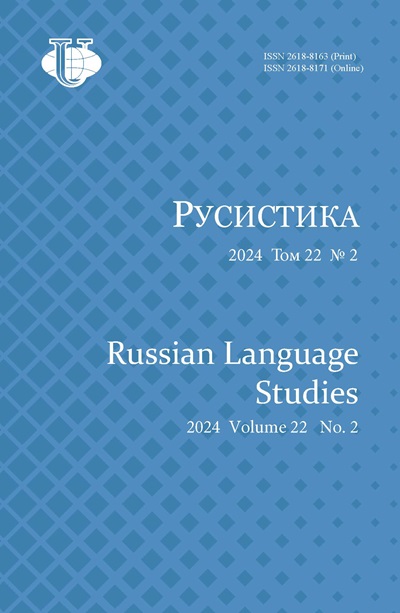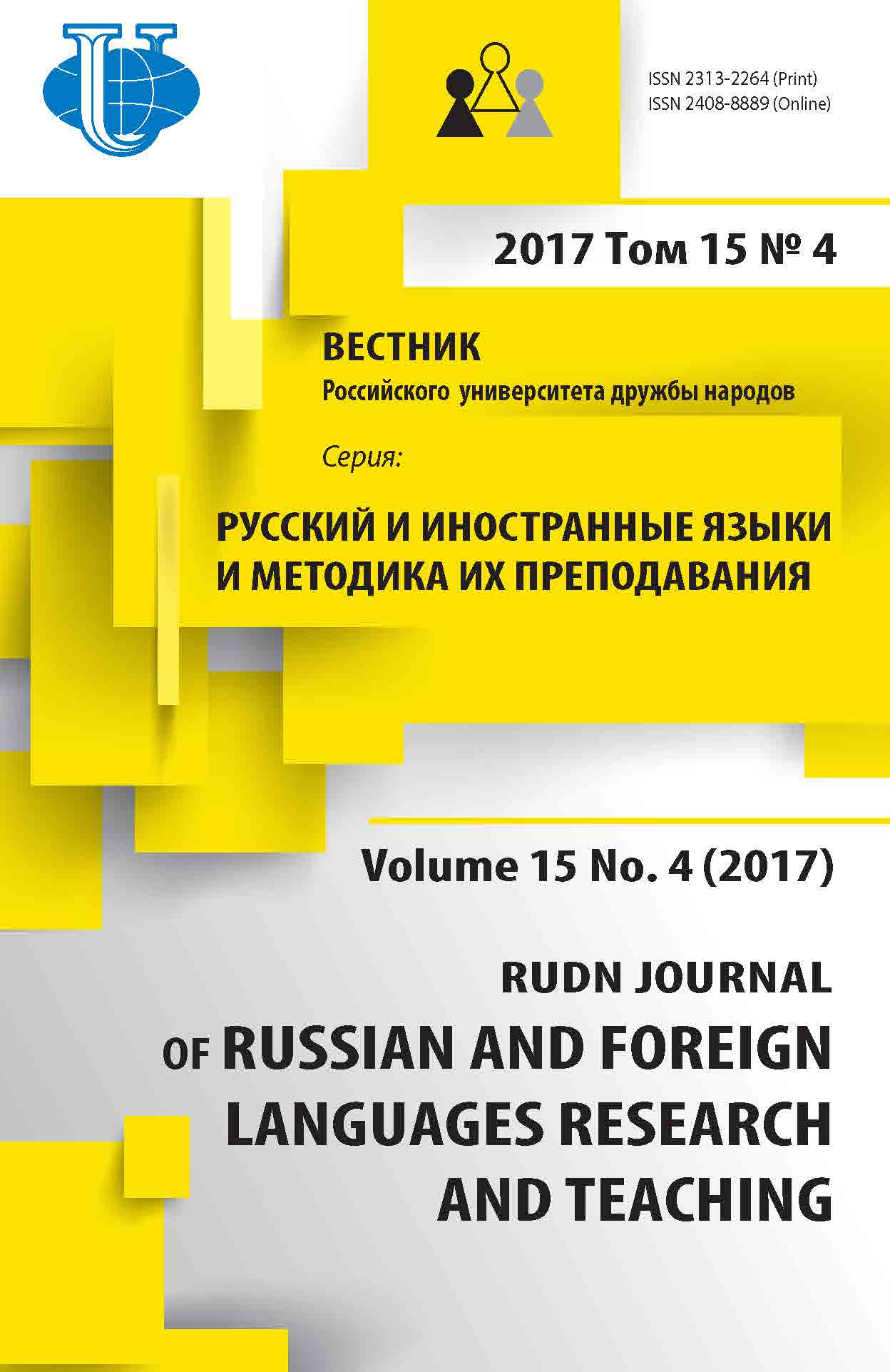ЖАНРОВО-ОРИЕНТИРОВАННЫЙ ПОДХОД, ЖАНРОВАЯ ГРАМОТНОСТЬ И ЖАНРОВАЯ КОМПЕТЕНТНОСТЬ КАК КАТЕГОРИИ ЛИНГВОДИДАКТИКИ
- Авторы: Сотова ИА1
-
Учреждения:
- Ивановский государственный университет
- Выпуск: Том 15, № 4 (2017)
- Страницы: 427-446
- Раздел: Статьи
- URL: https://journals.rudn.ru/russian-language-studies/article/view/17447
- DOI: https://doi.org/10.22363/2312-8631-2017-14-4-427-446
Цитировать
Полный текст
Аннотация
В статье исследуются понятия жанрово-ориентированный подход к обучению речевой деятельности, жанровая грамотность и жанровая компетентность как категории лингводидактики. Автор определяет жанрово-ориентированный подход как направленность языкового образования на овладение речевой деятельностью в жанровом аспекте, путем целенаправленного освоения жанровых форм повседневной, публичной и/или профессиональной речи с опорой на модели жанров речи, актуальных для того или иного контингента учащихся. Процесс освоения жанров речи включает последовательное достижение уровня жанровой грамотности и уровня жанровой компетентности. Жанровая грамотность понимается автором как способность языковой личности воспринимать и правильно использовать тексты/высказывания определенного круга жанров, осознание норм, правил и сценариев речевого поведения в типичных ситуациях общения. Представляет собой совокупность элементарных жанровых знаний, навыков, умений, компетенций, которые позволяют участвовать в повседневной и учебной коммуникации. Жанровая компетентность понимается автором как способность языковой личности сознательно прогнозировать жанровую организацию речи, понимать и порождать тексты/высказывания разной жанровой природы в зависимости от ситуации общения, управлять ситуацией общения. Представляет собой качество личности, определяющее способность и готовность к профессиональной (в том числе научной) коммуникации. Достижение уровней жанровой грамотности и жанровой компетентности рассматриваются автором как последовательные этапы развития жанрового мышления языковой личности. Переход от жанровой грамотности к жанровой компетентности характеризуется повышением уровня (глубиной) осознания жанрового аспекта речевой деятельности. Методическое сопровождение этого процесса является одной из важных задач методики русского языка как родного, как неродного и как иностранного. Развитие жанровых компетенций разных контингентов учащихся имеет свою специфику и требует разработки специальных жанрово-ориентированных методик обучения.
Об авторах
И А Сотова
Ивановский государственный университет
Автор, ответственный за переписку.
Email: irina_sota@mail.ru
Сотова Ирина Алексеевна, доктор педагогических наук, профессор, заведующий кафедрой русского языка и методики преподавания филологического факультета Ивановского государственного университета. Сфера научных интересов: методика преподавания русского языка, психолингвистика, языковая личность, речевое развитие языковой личности, речевой самоконтроль. Автор более 150 научных публикаций.
ул. Ермака, 39, Иваново, Россия, 153025Список литературы
- Авдеева И.Б. Лингводидактическая концепция обучения профессиональной коммуникации иностранных учащихся инженерного профиля: автореф. дисс. … д-ра пед. наук. М., 2006. 48 с.
- Азимов Э.Г., Щукин А.Н. Новый словарь методических терминов и понятий (теория и практика обучения языкам). М.: Изд-во ИКАР, 2009. 448 с.
- Антонова Л.Г. Обучение студентов-словесников профессионально значимым письменным жанрам: автореф. дисс. … д-ра пед. наук. М., 1998. 49 с.
- Ачкасов А.В. Жанровый подход к изучению второго языка // Интерпретация текста: лингвистический, литературоведческий и методический аспекты: cб. статей по материалам XVIII межд. науч. конф. / под ред. Г.Д. Ахметовой. Чита: Забайкальский гос. ун-т, 2015. С. 96-99.
- Бахтин М.М. Проблема речевых жанров // Эстетика словесного творчества / сост. С.Г. Бочаров. 2-е изд. М.: Изд-во «Искусство», 1986. С. 250-296.
- Глоссарий методических терминов и понятий (русский язык, литература): опыт построения терминосистемы / под общ. ред. Е.Р. Ядровской, А.И. Дунева. СПб.: Свое издательство, 2015. 306 с.
- Горелов И.Н., Седов К.Ф. Основы психолингвистики. М.: Лабиринт, 2004. 320 с.
- Дементьев В.В. Теория речевых жанров. М.: Знак, 2010. 600 с.
- Жанрово-стилевой подход в преподавании русского языка и культуры речи: cб. науч. статей и метод. рекомендаций по материалам Всероссийской научно-практ. конф. (г. Иваново, 28-29 марта 2013 г.) / сост. и науч. ред. И.А. Сотова (отв. ред.), Э.В. Кромер, М.М. Меликян. Иваново: Иван. гос. ун-т, 2013. 436 с.
- Исенина Е.И. Дословесный период развития речи у детей. Саратов, 1986.
- Карасик В.И. Языковой круг: личность, концепты, дискурс. М.: Гнозис, 2004. 390 с.
- Карасик В.И., Бейлинсон Л.С. Речевой жанр и речевое действие // Ученые записки Российского государственного социального университета. 2010. № 1. С. 123-126.
- Клобукова Л.П. Лингвометодические основы обучения иностранных студентов-нефилологов гуманитарных факультетов речевому общению на профессиональные темы: автореф. дисс.. д-ра пед. наук. М., 1995. 45 с.
- Колесникова Н.И. Лингводидактическая концепция формирования жанровой компетенции учащихся в системе непрерывного языкового образования: автореф. дисс. … д-ра пед. наук. Орел, 2009. 40 с.
- Колесова Н.Н. Обучение профессиональной русской речи иностранных студентов медицинского вуза (на примере жанра тематической беседы): автореф. дисс.. канд. пед. наук. М., 2017. 24 с.
- Коренева А.В. Профессионально ориентированное обучение речевой деятельности студентовнефилологов на основе междисциплинарной интеграции в курсе «Русский язык и культура речи»: автореф. дисс.. д-ра пед. наук. Орел, 2010. 48 с.
- Ладыженская Т.А., Ладыженская Н.В. Речевые жанры в курсе школьной риторики // Начальная школа: плюс-минус. 2001. № 12. С. 3-11.
- Левина Г.М. Обучение иностранцев русскому инженерному дискурсу как одной из составляющих профессионального образования в российских технических вузах: автореф. дисс. … д-ра пед. наук. М., 2004. 46 с.
- Мещеряков В.Н. Жанры школьных сочинений: теория и практика написания. М.: Флинта; Наука, 2001. 256 с.
- Основные результаты международного исследования PISA-2015. С. 14. [Электронный ресурс]. URL: http://36edu.ru/DocLib3/Docs/PISA2015.pdf (дата обращения: 8.09.2017).
- Романова Н.Н. Лингводидактическая система профессионально-коммуникативной подготовки специалистов в высшей технической школе: автореф. дисс.. д-ра пед. наук. М., 2009. 45 с.
- Седов К.Ф. Дискурс и личность: эволюция коммуникативной компетенции. М., 2004. 320 с.
- Седов К.Ф. Психолингвистический аспект изучения речевых жанров // Антология речевых жанров: повседневная коммуникация. М.: Лабиринт, 2007. С. 125.
- Сотова И.А. Жанрово-стилевой подход к обучению русской речи // Динамика языковых и культурных процессов в современной России: Материалы III Конгресса РОПРЯЛ. Санкт- Петербург, 10-13 октября 2012 г. / сост.е.Е. Юрков, Л.В. Московкин, Т.И. Попова. В 2 т. Т. 2. СПб., 2012. С. 387-390.
- Стрельчук Е.Н. Формирование русской речевой культуры иностранных бакалавров негуманитарных специальностей в вузах РФ: дисс.. д-ра пед. наук. М., 2016. 357 с.
- Тумина Л.Е. Основы обучения студентов-филологов устным профессионально значимым речевым жанрам повествовательного: автореф. дисс.. д-ра пед. наук. М., 1998. 41 c.
- Филиппова О.В. Пути реализации жанрового подхода к изучению курса «Русский язык и культура речи» в вузе // Предложение и слово. Межвуз. сб. науч. тр. / отв. ред. О.В. Мякшева. Саратов: Изд-во Саратовского ун-та, 2006. С. 577-581.
- Хаймович Л.В. Объяснительный монолог как педагогический речевой жанр // Педагогическая риторика: учеб. пособие / под ред. Н.А. Ипполитовой. М.: Инст. рус. яз., 2001. С. 230-251.
- Хехтель А.С. Лингвометодические основы обучения культуре профессионального общения студентов медицинских специальностей: автореф. дисс. … канд. пед. наук. М., 2008. 20 с.
- Чистякова О.А. Методика организации коммуникативного практикума в курсовом обучении русскому языку как иностранному: автореф. дисс. … канд. пед. наук. Ярославль, 2006. 23 с.
- Чумак К.Ю. Развитие коммуникативной компетенции старшеклассников при работе над проблемным очерком: автореф. дисс.. канд. пед. наук. Ярославль, 2012. 22 с.
- Шмелева Т.В. Модель речевого жанра // Жанры речи. Саратов: Изд-во Гос. УНЦ «Колледж», 1997. С. 88-98.
- Nikitina Y. Genre-sense approach to teaching listening skills of students of faculty of foreign languages // English Language Learning and Teaching: Theory and Practise. Edited by Marina Zhadeyko. London, 2011. Pp. 65-78.
- Сотова И.А., Колесова Н.Н. Обучение профессиональной русской речи иностранных студентов медицинского вуза на основе жанрово-ориентированного подхода // Вестник РУДН. Серия: Русский и иностранные языки и методика их преподавания. 2016. № 3. С. 58-63.
- Hekhtel, A.S. (2008). Lingvometodicheskiye osnovy obucheniya kulture professionalnogo obshcheniya studentov meditsinskih spetsialnostei [Linguistic and methodological bases of teaching of the culture of professional communication of medical students]. [Author’s abstr. cand. ped. diss.]. Moscow. (In Russ).
- Chistyakova, O.A. (2006). Metodika organizatsii kommunikativnogo praktikuma v kursovom obuchenii russkomu yazuku kak inostrannomu [Methods of organization communication workshop course in teaching Russian as a foreign language]. [Author’s abstr. cand. ped. diss.]. Yaroslavl. (In Russ).
- Chumak, K.Yu. (2012). Razvitiye kommunikativnoi kompetentsii starsheklassnikov pri rabote nad problemnym ocherkom [Development of communicative competence of senior pupils while working on a problematic essay]. [Author’s abstr. cand. ped. diss.]. Yaroslavl. (In Russ).
- Shmeleva, T.V. (1997). Model rechevogo zhanra. Zhanry rechi [Model of speech genre. Speech Genres (pp. 88-98)]. Saratov. (In Russ).
- Nikitina, Y. (2011). Genre-sense approach to teaching listening skills of students of faculty of foreign languages. English Language Learning and Teaching: Theory and Practice (pp. 65-78). London.
- Sotova, I.A., & Kolesova, N.N. (2016). Teaching Foreign Medical Students Professional Russian Speech on Base of Genre-oriented Approach. Bulletin of PFUR. Series: Russian and foreign languages and methods of their teaching. 3. (pp. 58-63). (In Russ).















